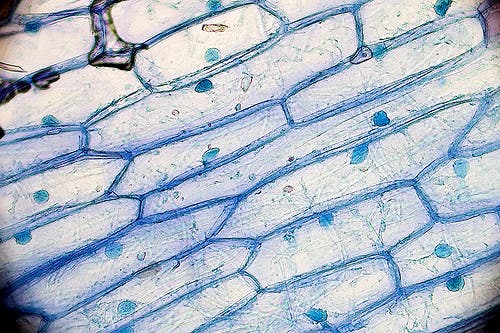Onions are one of the few truly global foods, with every major cuisine using the onion as a key ingredient. This means that millions of people are reduced to tears when preparing this hardy vegetable, but why? There’s some chemistry behind this delicious vegetable and why it makes you cry.

Sulfuric acid in your eyes
When onions grow, they absorb sulfur from the soil to form amino acid sulfoxides. When you cut into an onion, you slice open the onion’s cells causing their insides to pour out, along with all these substances. These sulfoxides then react with enzymes to form sulfenic acid. It is quite unstable and rearranges to form syn-propanethiol S-oxide, a combination of sulfuric acid, sulfur dioxide and hydrogen sulfide. A lot of un-unpleasant substances!
This gas drifts up to the eyes of the cutter and makes contact with nerve-endings on the surface of the eye. Nerves recognize it as dangerous and interpret the contact as a burning sensation, so the tear response reflexively makes tears to combat the irritation.

Cooked onions don’t hurt
Cooking the onion inactivates the enzymes so that it doesn’t irritate your eyes while you are cooking or enjoying your meal. The sooner you cook it, the sooner it stops hurting.

What can you do?
No one likes crying, and if you do have some reason to cry, it definitely shouldn’t be onions. There are many different strategies to try if you are tired of weeping every time you are trying to make French onion soup. They all revolve around keeping the sulfuric gas from reaching your eyes.
- Block the gas completely. You can wear regular or fancy safety goggles, but make sure that they are sealed at the sides.
- Slow down or inhibit the reactions that create the irritating compound. Freezing the onion for 15 minutes or keeping it in the refrigerator results in a sting-free cutting experience.
- Re-direct the irritating gases. Cutting under running water works though it is rather logistically difficult. A more practical method is to turn on the kitchen stove vent and cut under it.
- Draw out the sulfuric compounds from the onion. Soaking the onions in water for 15 minutes works but causes the onions to lose some flavour.
- Buy different onions. Sweet onions, scallions, and red onions cause less irritation while white onions are the worst at making you cry because they absorb more sulfur from the soil.
Other old wives’ tales that that do not hold up in practice are lighting a candle and chewing gum while cutting.
So, there you have it – why onions make you cry, according to science, and how you can stop it. Bon appétit!






